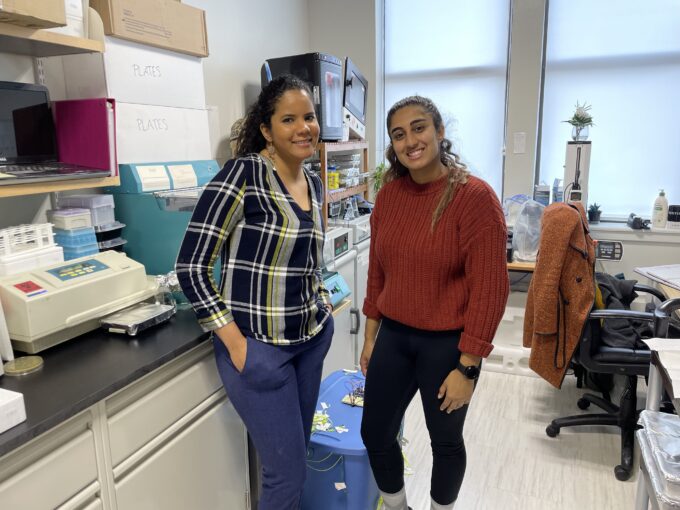The environmental concerns of cow leather are well known—from the greenhouse gas emissions associated with cattle raising, to chemical pollution, and beyond. But pleather and vegan leather bring their own problems as well, as these alternatives are usually made from plastics.
Plastic pollution is part of what pushed Lina M. González—a synthetic biologist whose research focused on engineering cells and 3D-printing spores—from academia into entrepreneurship. When she realized microbes could create carbon-negative materials for applications across vegan leather, insulation, packaging, and more, González co-founded SpadXTech with mechanical engineer Connor Crawford in 2020. The pair got married this summer.
“My main motivation is transforming the materials world so we can bring really benign materials into the market,” says González, the startup’s CEO. “SpadXTech’s cellulose-based materials are durable, yet under the right conditions they can degrade and not persist in the environment.”
SpadXTech’s microbes eat sugar and channel carbon to spin out cellulose fibers, which the startup can then process into a wide range of materials, including plastic-free, vegan leather. The end-product is carbon-negative, González explains, because the microbes upcycle carbon and SpadXTech exclusively plans to use renewable energy for its processes.
With vegan leather as its first product, SpadXTech’s primary customers are small vegan leather brands, though it also offers some leather-alternative wallets and other items of its own. Vegan leather is merely the first application of SpadXTech’s microbe-spun materials, with insulation as a future market.

Samples of AirPods cases made using SpadXTech’s materials.
A major focus area for SpadXTech in the coming months is raising seed funding, according to González. The four-person startup has already won a number of non-dilutive funding awards to support its development, including Phase I and Phase II SBIR grants from the National Science Foundation, a Catalyst/DICES award from the Massachusetts Clean Energy Center, and a FORGE Product Development Grant.
SpadXTech is part of the inaugural cohort of ACCEL—an accelerator from Greentown and Browning the Green Space (BGS) designed to support BIPOC-led startups by offering access to funding, networking connections, resources, and opportunities that structural inequities put out of reach. The program combines acceleration with a curated curriculum, incubation through Greentown membership, and extensive mentorship from Greentown and BGS’s networks of industry experts.
During ACCEL, González workshopped her pitch with Sophie Wadsworth, a pitch coach who’s been working closely with the cohort. Wadsworth helped González simplify her pitch to make her key messages more powerful, guided her on how to best utilize hand motions, suggested asking her audience a rhetorical question to get them thinking creatively, and more.
González has also found the advice of her ACCEL expert mentors—Mitch Tyson, Principal of Tyson Associates and a board member of Greentown and the Northeast Clean Energy Council, and Tinia Pina, CEO and founder of Re-Nuble and a board member of the NYC Agriculture Collective and Oregon Tilth—hugely helpful, including with refining her pitch content and delivery. She noted how beneficial the Aspire Program, administered by ACCEL’s Curriculum + Resources Partner VentureWell during the accelerator, has been as well.
“ACCEL has been great, I really love it,” González says. “ACCEL gives participating startups a stipend, but all the benefit we’re getting from the program is so much more than that. We have access to the great Greentown community, which helps with meeting investors, meeting potential partners, things like that.”

